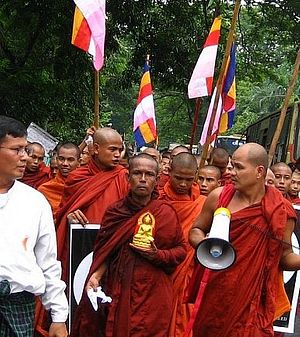More rioting between Buddhist and Muslim groups erupted in Myanmar early this month, killing two people and injuring 14 others. The fatalities included a young Buddhist man who was riding a bike and a Muslim bicycle shop owner. The riots – which took place over four days in Mandalay, Myanmar’s second largest city – were triggered by an unverified online story about an alleged raping of a Buddhist employee by her Muslim employers in a tea shop.
In contrast to their sluggish response in the past, the police were quick to act and restore order. About 362 rioters were arrested and a curfew imposed.
Speculation is rife that the riots were deliberately planned to sow panic and distract public attention. Just a few hours before the riots broke out, the Young Buddhists Association warned of a plot to provoke violence in the country. “We received news that the instigators who want to create religion or race-based violence are planning to inflame [the situation] on the Internet’s social networks and across the country.”
The London-based Burmese Muslim Association described the violent conflict as a “well-planned operation, carried out by a group of well-trained thugs.”
“Since 1 July 2014, a van and a group of about 30 motorbikes, carrying mobs armed with machetes and lethal weapons, were roaming around the city of Mandalay and targeting various Muslims, shops and businesses owned by Muslims, and a number of Islamic religious institutions and premises,” the group said in a statement.
Thein Win Aung, vice chairman of a peace group which was initiated by religious leaders and residents right after the clashes in Mandalay, suspected that the riot could be a “political trick” to stop people from supporting the 436 campaign which aims to amend the country’s military-backed constitution. “If we do not understand these political tricks, if we do not control each other, if we allow ourselves to fall into the trap, then not only Mandalay, but the entire country, will be consumed in the flames of chaos.”
Indeed, the riots have discouraged many people from actively discussing the campaign for constitutional reforms, which is a major political initiative of the opposition led by democracy icon Aung San Suu Kyi.
But the riots could also mean that religious extremism continues to strengthen its grip on the country. Recent years have seen a surge in anti-Muslim sentiment among the Burmese, majority of whom are Buddhist. Some Buddhist leaders have been openly attacking the Muslim community for conspiring to dominate Myanmar.
Unfortunately, those who share these feelings have been effectively using the Internet, particularly the popular social networking site Facebook, to incite more hatred against the Muslims. This led Burmese American author Kenneth Wong to ask netizens to be more responsible when using the Internet. “In today’s tinderbox environment of Burma, it only takes one irresponsible news story and a few thousand mouse clicks on Facebook to set Mandalay or any other major city ablaze.”
The government quickly ordered the blocking of Facebook during the riots to prevent the dissemination of hate speech. Myanmar Chief Police Officer Win Kaung admitted in an interview with the Irrawaddy magazine that blocking Facebook was necessary to stop the violence. “Yes, we blocked it. We wanted to stop the instigation. When they are doing the instigation or spreading the unverified news, this could only provoke the underlying hatred between different groups or people; one’s own word or line could lead to a bigger conflict.”
There were mixed reactions to the blocking of Facebook. Some supported it while others were concerned about its impact on the country’s efforts to improve the state of free speech. Today, Facebook was blocked to stop rioting but will the police adopt the same measure to quell anti-government protests in the future?
Also troubling was the reported threats made by the mob against journalists and news agencies covering the riot. These threats appeared to dissuade journalists from documenting the full impact of the riots in Mandalay.
Myanmar’s transition to democracy cannot succeed without serious efforts to promote interfaith harmony. The Mandalay riots should serve as a timely reminder to all stakeholders, including the global community, that Myanmar is undergoing a turbulent transition and the country requires more than just political and constitutional reforms.

































